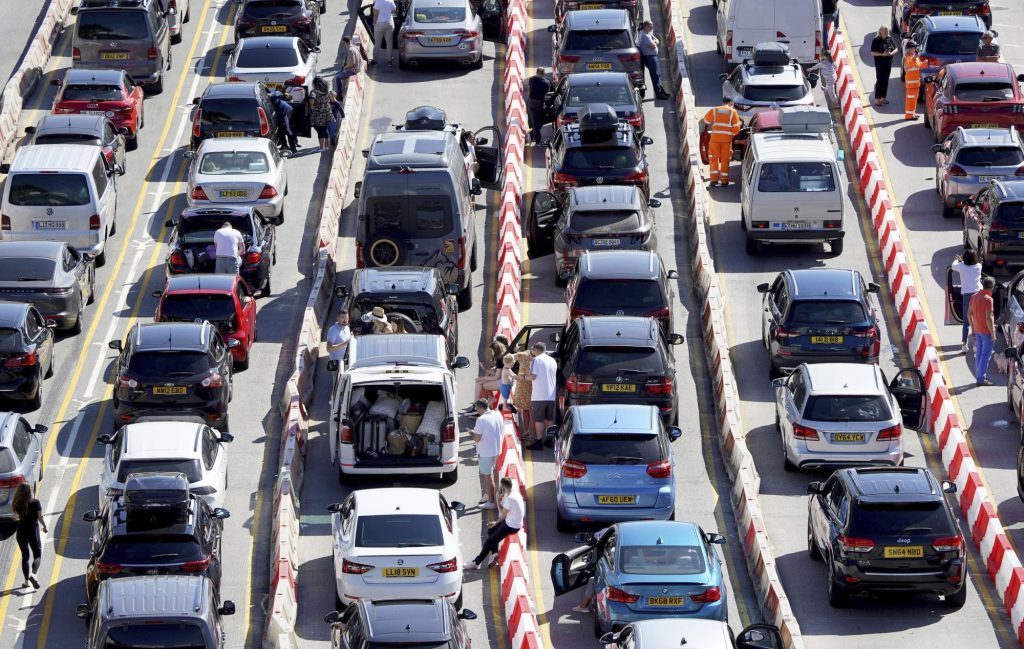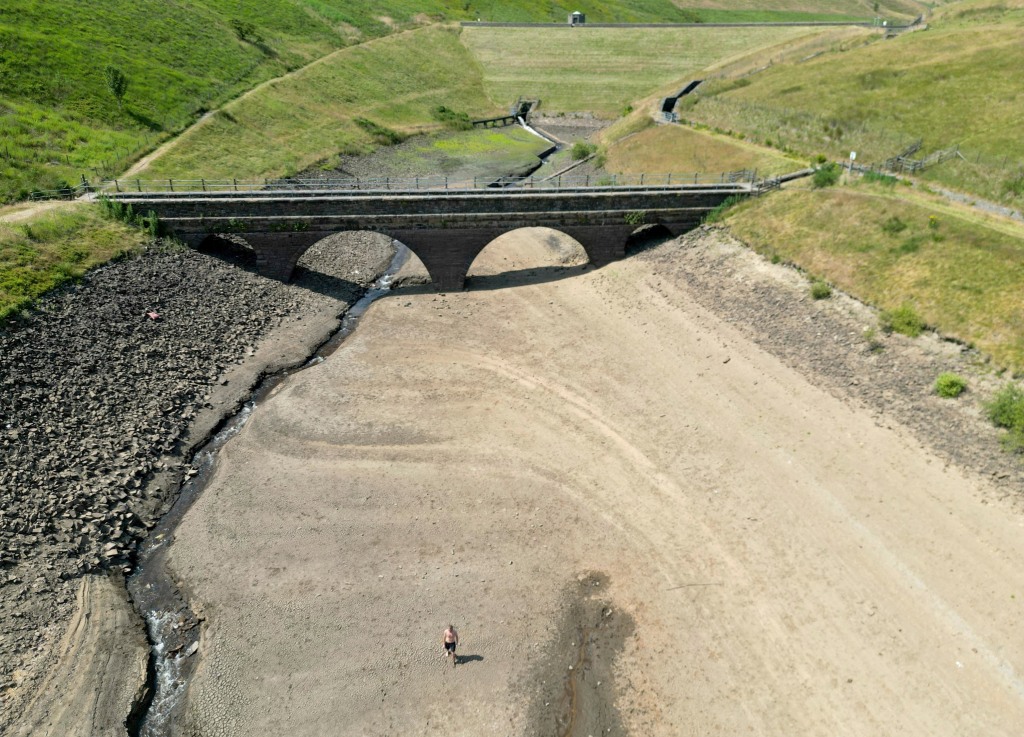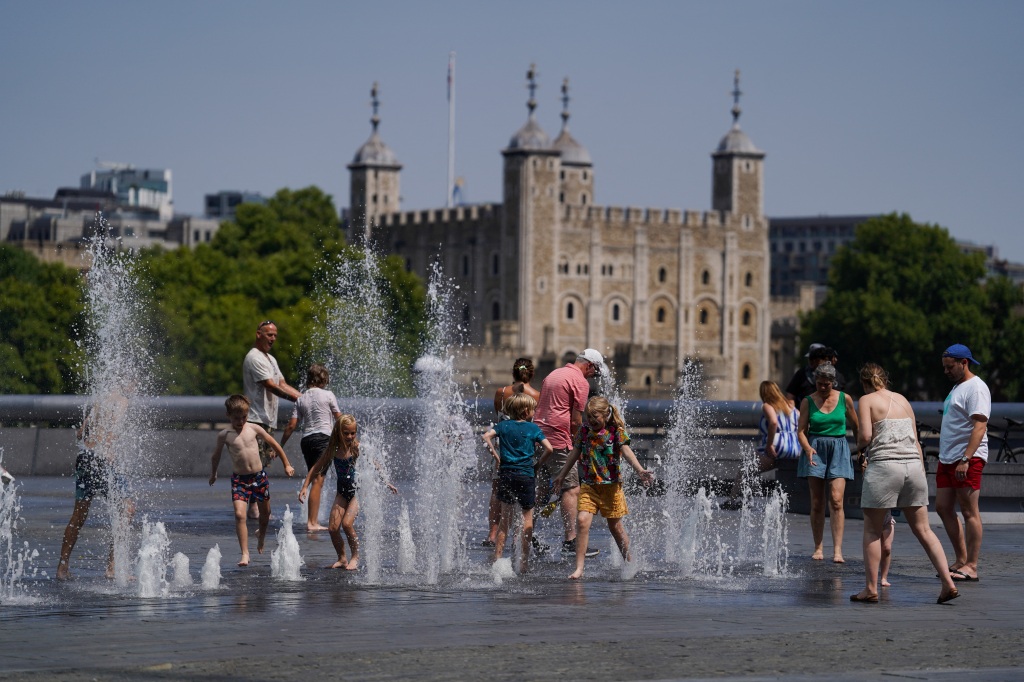UK braces for record-breaking temps as heatwave plunges Brits into chaos
Brits are bracing for record-breaking highs on Tuesday as temperatures are expected to soar to 104 degrees — surpassing the previous record of 101 degrees recorded in 2019.
A national “state of emergency” was declared this week, with the UK’s Meteorological Office issuing a “threat to life” warning across the country as a result of the heat.
The UK recorded its warmest night on record at 77 degrees on Monday.
At least five people, including three teenagers, drowned across the country in rivers, lakes, and reservoirs while trying to cool off.
The heatwave plunged the country into chaos, forcing train services to stop, some schools to close and zoos to feed animals with popsicles.
Met Office forecaster Rachel Ayers said Tuesday’s highs would be “unprecedented.”
“The temperature will be very hot throughout the day, before rising as high as 104 degrees, maybe even hitting 105 degrees in isolated spots across England during the afternoon,” she said.
Average July temperatures in the UK range from a daily high of 70 degrees to a night-time low of 53 degrees, and very few buildings are equipped with air conditioning units.
The runway at London’s Luton Airport was shut down for over an hour Monday after extreme heat caused a section of the tarmac to buckle, prompting major delays and cancelations as a result.
Brits are facing widespread travel problems and are being urged to travel only if absolutely necessary. For those that need to travel, UK’s Network Rail is running a dramatically reduced service.

London’s Kings Cross Station, one of the country’s busiest rail hubs, was empty on Monday, with no trains on the busy east coastline connecting the capital to the north and Scotland.
Transport minister Grant Shapps said it would be many years before Britain could fully upgrade its infrastructure to cope with higher temperatures.
“We’ve seen a considerable amount of travel disruption,” he told the BBC. “We’re probably going to see the hottest day ever in the UK recorded today, and infrastructure, much of which was built from the Victorian times, just wasn’t built to withstand this type of temperature.”

Sales of electric fans, hoses, AC units, and sprinklers continue to soar.
It’s not just the UK baking in the heat this week. Much of Europe is dealing with a surge in temperatures, with high temperatures sparking wildfires to rage across the countryside in Portugal, Spain, and France.
About 14,000 people had been evacuated from France’s Gironde region by Saturday afternoon as more than 1,200 firefighters battled to bring the flames under control, regional authorities said in a statement.
In Spain, more than 3,000 people have been evacuated from homes due to a large wildfire near Mijas, a town in the province of Malaga that is popular with northern European tourists, the region’s emergency services said.

Thick black plumes of smoke rose into the air near Casas de Miravete in the Extremadura region as helicopters dumped water on flames that have scorched 3,000 hectares, forced the evacuation of two villages, and threatened to reach the Monfrague national park.
In the UK, some hospitals were forced to cancel surgeries as the operating rooms became too hot.

Many hospitals canceled routine appointments to make space for heat-related emergencies.
Some 200 schools across the country were also forced to close, despite the government urging principals to keep them open.
Schools said buildings became “unsafe” in the heat, as children were unable to use local playgrounds because metal climbing frames were deemed to be a scorch hazard.

Most British schools have not yet closed for the summer.
Even Parliament was forced to loosen its strict dress code, with the Speaker of the House of Commons allowing male lawmakers to ditch jackets and ties for the week.
Climate experts warn global warming increased the frequency of extreme weather events, and say the likelihood of UK temperatures reaching 104 degrees is now 10 times higher than in the pre-industrial era.
Drought and heat waves tied to climate change also made wildfires harder to fight.
With Post wires
Read the full article Here


